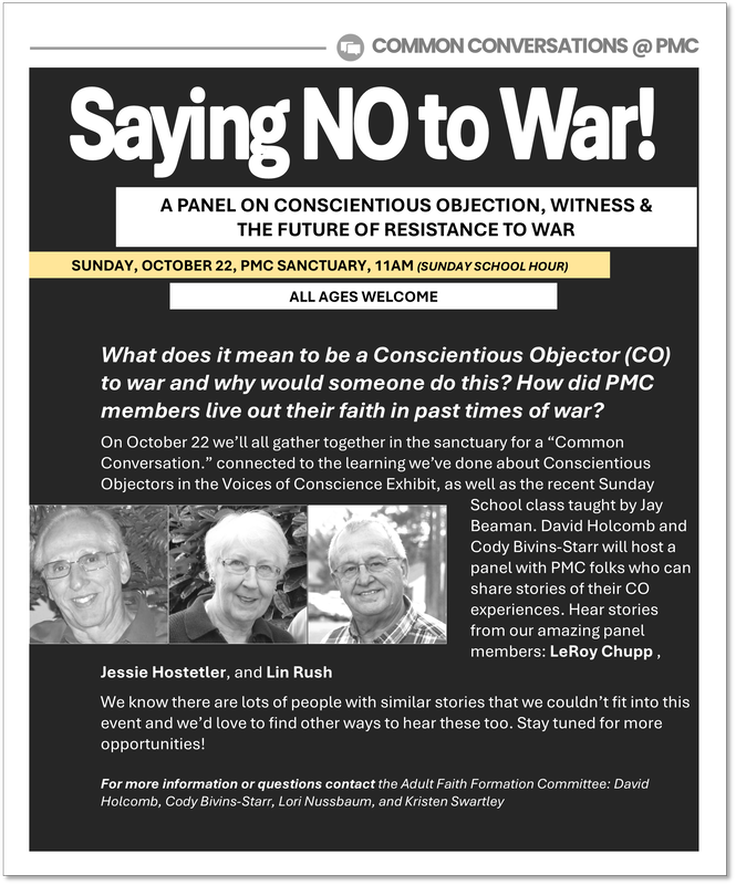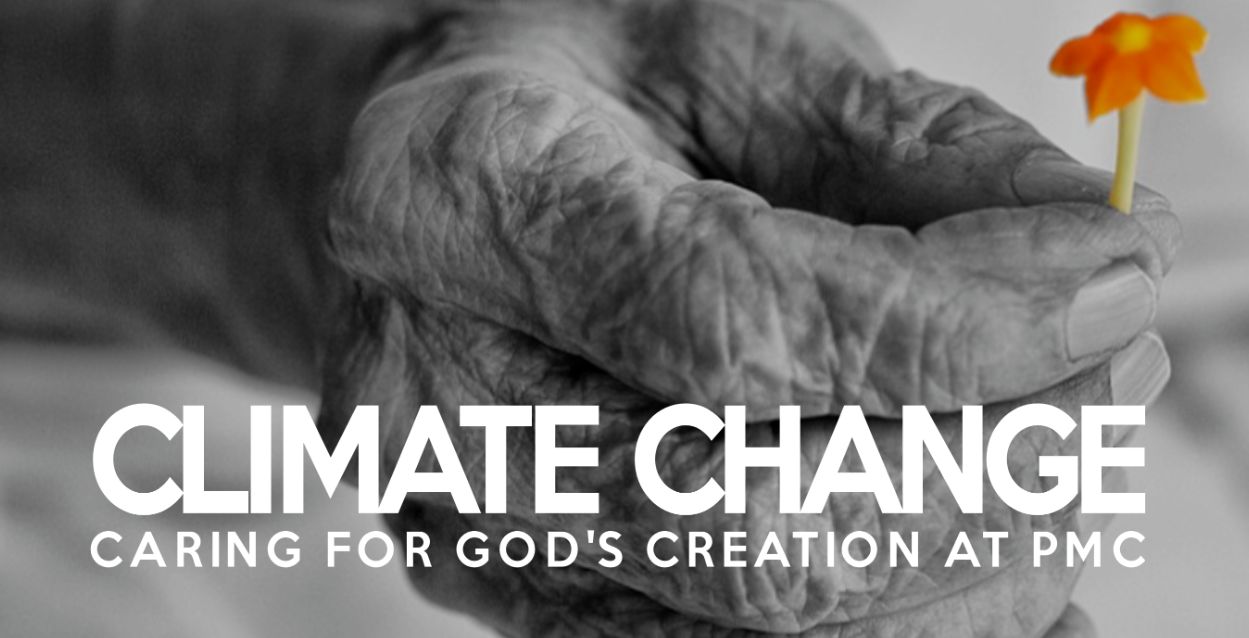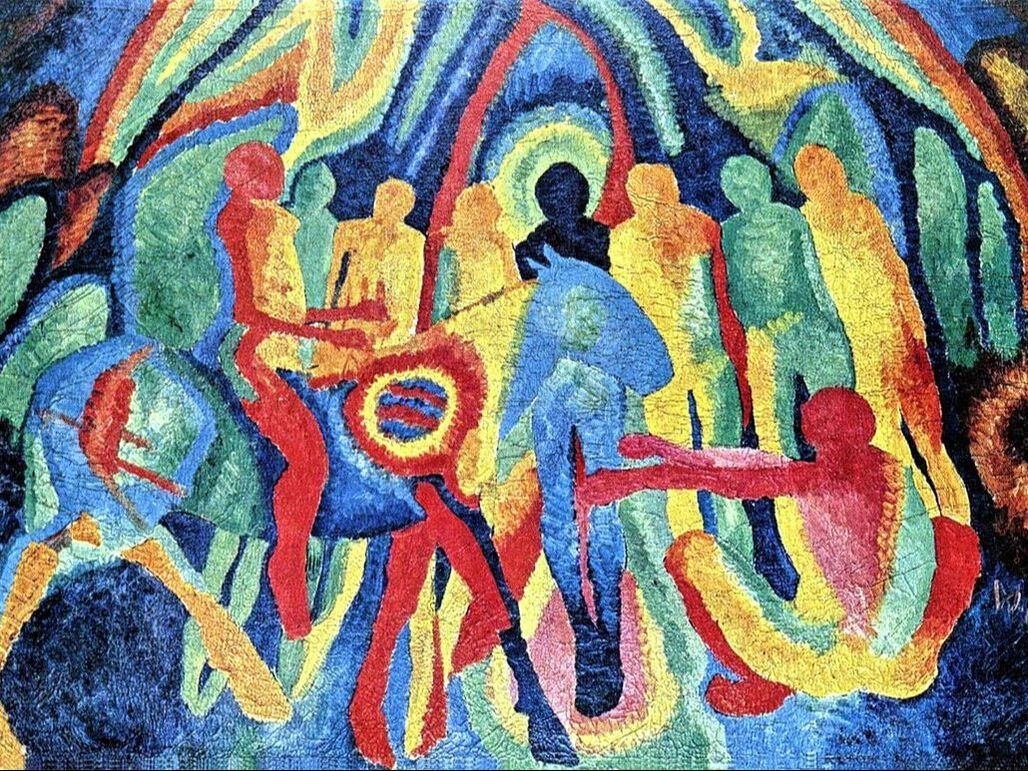|
LEADER: Jay Beaman, In connection with the exhibit at Lewis & Clark College, this class explored the histories of those who were conscientious objectors to participation in the military.
0 Comments
Praying the Psalms… in the key of Jesus.We will seek to better understand this book of the Bible – as individual poems written by (and/or for) David and many others; as a collection shaped by the life of ancient Israel; as the songbook used in the temple and synagogue (including in the time of Jesus); as a prayer book for many segments of the church over the past 2,000 years. While understanding the Psalms is important, the Psalms are meant to be experienced. So, we will spend time praying the Psalms together, with the hope of being more deeply grounded in God by being more deeply grounded in the Psalms. In all of this, we will stay attuned to Jesus. After all, he would have been shaped by praying these same Psalms. Even more, Jesus claims that the Law of Moses, the Prophets, and the Psalms all testify about him. May we learn from him as we pray with him.
Mission of this Class: Encourage Portland Mennonite Church to become a community of alternative practices, grounded in our Anabaptist commitments to simplicity and peacemaking, that responds practically and prophetically to the alarming realities of global climate change This is a six-week class discussion on how food, transportation, consumerism, and housing choices affect climate change. How does the Mennonite commitment to simplicity and peacemaking inform our responses to this crisis and how are we as a PMC community responding to caring for the environment? LEADER: Cody Bivins-Starr Experiencing disability opens various possibilities for new understandings of what it means to be human. This class explores the Christian tradition and its core theological ideas through the lens of disability, addressing areas of tension, areas of promise, and seeking new ways of participating in God’s community of belonging.
2022, Journal of the Christian Institute on Disability
Creating Safe Space |
|||||||||||||||||||||||||||||||||||||||||||||||||||||||||||||||||||||||||||||||||||||||||||
| week_1_creating_safe_space_intro.pdf | |
| File Size: | 1302 kb |
| File Type: | |
| week_1_safe_zone_2016_intro_and_m1.pdf | |
| File Size: | 1746 kb |
| File Type: | |
| week_2_creating_safe_space_zoom.pdf | |
| File Size: | 1101 kb |
| File Type: | |
| week_2_safe_zone_2016_module_2.pdf | |
| File Size: | 195 kb |
| File Type: | |
| week_3_becoming_an_ally.pdf | |
| File Size: | 160 kb |
| File Type: | |
| week_3_safe_zone_module_3_and_end_material_2016_rgb.pdf | |
| File Size: | 310 kb |
| File Type: | |
| week_4_actions.pdf | |
| File Size: | 86 kb |
| File Type: | |
Jan-Feb 2023 / Portland Mennonite Church / David Holcomb
BIBLE STUDY – GENESIS 1-11
Join us in January and February as we explore the literary artistry of the
first eleven chapters of Genesis, and as we consider what this text has to do with Jesus and with our
current world. These earliest chapters in our Bibles contain stories that many heard as children in
Sunday School and that are still deeply embedded in the larger culture. So, they are familiar – perhaps
too familiar and in need of another look. Let’s take a look together!
Week 1: Genesis 1 - The First Creation Story
Reading the text and making some observations
Week 2: Genesis 1 - The First Creation Story
Reading the text again and some comparisons with other Ancient Near East creation accounts
Week 3: Genesis 2 - Adam & Eve
Reading the text and making some observations
Week 4: Genesis 3 – Adam, Eve, and “the fall”
Reading the text and making some observations
Week 5: Genesis 1-3 Theological Reflections
Time on your own to think about one of the questions on the reflections sheet
Some time for sharing and discussion
Week 6: Genesis 4 – Cain and Abel
Reading the text and making some observations
Connections with Genesis 1-3
Week 7: Genesis 6-9
Reading the text and making some observations
Connections with Genesis 1-4
Week 8: Genesis 10-12 – Tower of Babel and the call of Abram
Reading the text and making some observations
Discussion for all 8 weeks – what have we learned?
BIBLE STUDY – GENESIS 1-11
Join us in January and February as we explore the literary artistry of the
first eleven chapters of Genesis, and as we consider what this text has to do with Jesus and with our
current world. These earliest chapters in our Bibles contain stories that many heard as children in
Sunday School and that are still deeply embedded in the larger culture. So, they are familiar – perhaps
too familiar and in need of another look. Let’s take a look together!
Week 1: Genesis 1 - The First Creation Story
Reading the text and making some observations
Week 2: Genesis 1 - The First Creation Story
Reading the text again and some comparisons with other Ancient Near East creation accounts
Week 3: Genesis 2 - Adam & Eve
Reading the text and making some observations
Week 4: Genesis 3 – Adam, Eve, and “the fall”
Reading the text and making some observations
Week 5: Genesis 1-3 Theological Reflections
Time on your own to think about one of the questions on the reflections sheet
Some time for sharing and discussion
Week 6: Genesis 4 – Cain and Abel
Reading the text and making some observations
Connections with Genesis 1-3
Week 7: Genesis 6-9
Reading the text and making some observations
Connections with Genesis 1-4
Week 8: Genesis 10-12 – Tower of Babel and the call of Abram
Reading the text and making some observations
Discussion for all 8 weeks – what have we learned?
Adult Faith Formation
A collection of Resources produced by Adult Faith Formation Classes at Portland Mennonite Church.
Categories
All
Climate
Cody Bivins-Starr
Conscientious Objection
Creation Care
David Holcomb
Disability
Gender
Genesis
Jay Beaman
LGBTQ+
Peacemaking
Psalms
Sexuality
Ted Grimsrud





 RSS Feed
RSS Feed
